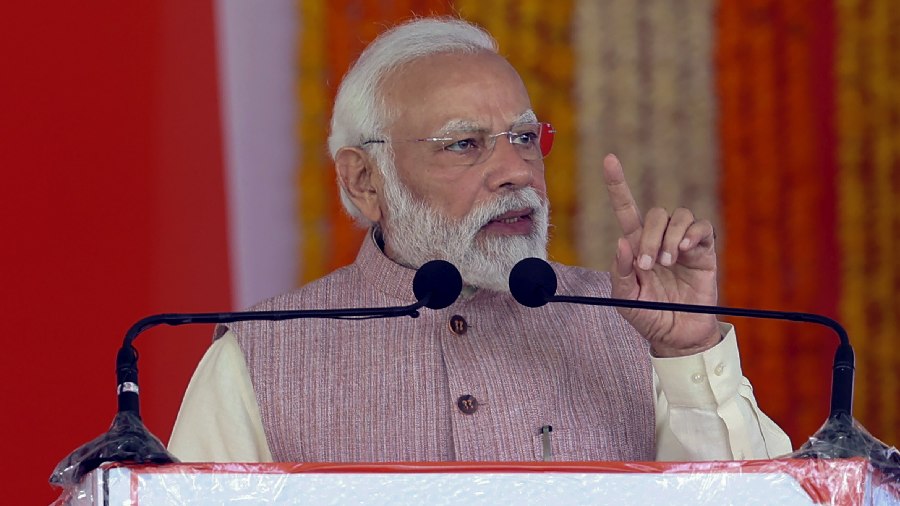Prime Minister Narendra Modi has said that an idea becomes a mass movement when it moves from "discussion tables to dinner tables" as he called for people's participation and collective efforts in combating climate change.
He also told a gathering of world leaders via video link on Friday that when people become conscious that simple acts in their daily lives are powerful, there will be a very positive impact on the environment.
"People across the world hear a lot about climate change. Many of them feel a lot of anxiety because they do not know what they can do about it. They are constantly made to feel that only governments or global institutions have a role. If they learn that they can also contribute, their anxiety will turn into action," Modi said while addressing the World Bank-organised "Making it Personal: How behavioral change can tackle climate change" conference.
Modi hailed the World Bank for organising the event on impact of behavioural change on climate change, saying this is an issue close to his heart, and it was great to see it becoming a global movement.
Citing "Mission Life", which was launched by him and the UN secretary general last year October, Modi said the programme is about democratising the battle against climate change.
"Climate change cannot be fought from conference tables alone. It has to be fought from the dinner tables in every home," he told the conference being held on the sidelines of the annual spring meetings of the International Monetary Fund and the World Bank.
"When an idea moves from discussion tables to dinner tables, it becomes a mass movement. Making every family and every individual aware that their choices can help the planet can provide scale and speed," he said.
Prime Minister Modi said when people become conscious that simple acts in their daily lives are powerful, there will be a very positive impact on the environment. The people of India have done a lot in this matter in the last few years, he said.
"People-driven efforts improved the sex ratio in many parts of India. It was the people who led a massive cleanliness drive. Be it rivers, beaches or roads, they are ensuring public places are free of litter. And, it was the people who made the switch to LED bulbs a success. Nearly 370 million LED bulbs have been sold in India. This helps in avoiding nearly 39 million tonnes of Carbon Dioxide emissions every year," the prime minister said.
The farmers of India ensured the coverage of nearly seven hundred thousand hectares of farmland by micro-irrigation. Fulfilling the mantra of 'Per Drop More Crop', this has saved a huge amount of water, he pointed out.
"Under Mission Life, our efforts are spread across many domains such as: Making local bodies environment-friendly, saving water, saving energy, reducing waste, and e-waste, adopting healthy lifestyles, adoption of natural farming, promotion of millets," Modi said.
These efforts will save over 22 billion units of energy, save nine trillion litres of water, reduce waste by 375 million tons, recycle almost one million tons of e-waste, and generate around 170 million dollars of additional cost saving by 2030, he said.
"Further, it will help us reduce the wastage of 15 billion tons of food," Modi said, noting that the global primary crop production in 2020, according to the Food and Agriculture Organisation, was about nine billion tons.
He said global institutions have an important role to play in encouraging countries across the world.
The World Bank Group is looking to increase climate finance from 26 per cent to 35 percent as a share of total financing. The focus of this climate finance is usually on conventional respects, he noted.
The prime minister said adequate financing methods need to be worked out for behavioral initiatives too and a show of support by the World Bank towards behavioral initiatives such as Mission Life will have a multiplier effect.
In 2015, at the United Nations General Assembly, Modi spoke about the need for behavioural change.
"The preamble to the outcome document of CoP-27 also speaks about sustainable lifestyle and consumption. And it is wonderful to see that experts in the climate change arena have also adopted this mantra," he added.
"By itself, each good deed for the planet may seem insignificant. But when billions across the world do it together, the impact is huge. We believe that individuals making the right decisions for our planet are key in the battle for our planet. This is the core of Mission LiFE,” he said.
India has maintained that the fight against climate change must keep the principles of equity and Common but Differentiated Responsibilities and Respective Capabilities (CBDR-RC) at the centre.
Equity essentially means that each country's share of carbon dioxide emissions is equal to its share of the global population.
The CBDR-RC principle recognises that each country is responsible for addressing climate change but developed countries should bear primary responsibilities as they account for most of the historical and current greenhouse gas emissions.
According to the Union Environment Ministry, India is home to 17 per cent of the global population but accounts for only four per cent of global carbon emissions. Developed nations with the same percentage of population account for nearly 60 per cent of carbon emissions.
India updated its Nationally Determined Contributions (NDCs) – plans to limit global warming to 1.5 degrees Celsius – in August last year, promising to reduce emissions intensity of GDP by 45 per cent by 2030, from the 2005 level, and achieve 50 per cent cumulative electric power installed capacity from non-fossil fuel-based energy resources by 2030.
Except for the headline, this story has not been edited by The Telegraph Online staff and has been published from a syndicated feed.











